(If you missed the previous installments in this series, please click here.)
New Zealand Herald: Editorial: Red alert over WikiLeaks unnecessary
"Secretary of State Hillary Clinton has suggested the disclosure "puts people's lives in danger, threatens our national security and undermines our efforts to work with other countries to solve shared problems". Such language does not bode well for a cogent and calculated response. In fact, the intelligence information released so far contains nothing to substantiate Mrs Clinton's claims.[...]
Obviously, Washington is embarrassed. But, so far, that is all. There has, contrary to the Secretary of State's view, been no irresponsible naming and endangering of individual lives or national security.
Much of the credit for this must go to WikiLeaks' decision, as with military documents released this year, to rely on three major newspapers - the Guardian, the New York Times and Der Spiegel - for a reasoned analysis of the cables. This has been no anarchic exercise, based on a naive view that it is right and proper for all information to be in the public domain.[...]
The cork is out of the bottle. If WikiLeaks is silenced, others will pick up its ideas."
Read more
Paul Craig Roberts, CounterPunch: What the Wiki-Saga Teaches Us
"The reaction to WikiLeaks and its founder, Julian Assange tells us all we need to know about the total corruption of our “modern” world, which in fact is a throwback to the Dark Ages.
Some member of the United States government released to WikiLeaks the documents that are now controversial. The documents are controversial, because they are official US documents and show all too clearly that the US government is a duplicitous entity whose raison d’etre is to control every other government.
The Guardian: WikiLeaks cables portray Saudi Arabia as a cash machine for terrorists
"Saudi Arabia is the world's largest source of funds for Islamist militant groups such as the Afghan Taliban and Lashkar-e-Taiba – but the Saudi government is reluctant to stem the flow of money, according to Hillary Clinton.
"More needs to be done since Saudi Arabia remains a critical financial support base for al-Qaida, the Taliban, LeT and other terrorist groups," says a secret December 2009 paper signed by the US secretary of state. Her memo urged US diplomats to redouble their efforts to stop Gulf money reaching extremists in Pakistan and Afghanistan.
"Donors in Saudi Arabia constitute the most significant source of funding to Sunni terrorist groups worldwide," she said. Three other Arab countries are listed as sources of militant money: Qatar, Kuwait and the United Arab Emirates."
Read more
The Guardian: Brazil denied existence of Islamist militants, WikiLeaks cables show
"Brazil's government covered up the existence of Islamist terrorist suspects in São Paulo and border areas in an apparent bid to protect the country's image, according to secret US documents released by WikiLeaks.
The administration of former president Luiz Inácio Lula da Silva publicly denied that militant Islamists were active in Brazil, even while its law enforcement agencies co-operated closely with the US in monitoring suspects.
"Despite publicly expressed sentiments of high-level officials denying the existence of proven terrorist activity on Brazilian soil, Brazil's intelligence and law enforcement services are rightly concerned that terrorists could exploit Brazilian territory to support and facilitate terrorist attacks, whether domestically or abroad," said a US embassy cable."
"The first serious infowar is now engaged. The field of battle is WikiLeaks. You are the troops," wrote John Perry Barlow on Twitter.
The censorship vs. free speech battle is escalating. This week has seen Amazon, Tableau, EveryDNS and PayPal dropping WikiLeaks services in quick succession, DDoS attacks that caused the site to go offline multiple times, and mounting political pressure from the US (2), Australian and French governments.
The US government went so far as to warn Switzerland against granting Julian Assange political asylum, reports 20 Minuten. In an open letter in Der Sonntag, the US ambassador to Switzerland, Donald Beyer, wrote that "Switzerland will have to consider very carefully whether to provide shelter to someone who is a fugitive from justice." However Swiss politicians including Cédric Wermuth, president of the Young Socialist Party, Bastien Girod, president of the Greens National Council, and the Swiss Pirate Party have reiterated their support for Assange and willingness to grant him asylum.
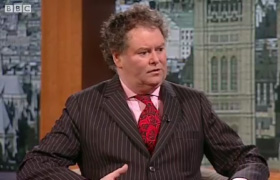
In an interview with the BBC's Andrew Marr, lawyer Mark Stephens said:
"In Sweden it's quite bizarre though, because the chief prosecutor, the director of public prosecution in Sweden dropped the entire case against him, saying there was absolutely nothing for him to face, back in September. And then, a few weeks ago, after the intervention of a Swedish politician, a new prosecutor, not in Stockholm, where Julian and these women had been, but in Gothenburg, began a new case, which of course has resulted in these warrants and of course the Interpol red notice being put out across this week.
It does seem to be a political stunt, I mean, I have, and his Swedish lawyer, have been trying to get in touch with the prosecutors since August. Now, usually, it's the prosecutor who does the pursuing, not the pursued. And in this particular case, Julian Assange has tried to vindicate himself, has tried to meet with the prosecutors, to have his good name restored."
He remarked that "A warrant was issued on Thursday by reports. We've asked for it. We've been ignored at this point," adding that "He's only wanted for interview, why not have that interview by consent, rather than this show trial?"
He also talked about the calls for assassination coming from "credible sources around the world," and particularly the United States, including people as high up as Sarah Palin. He said that Julian Assange would certainly fight deportation to Sweden on the grounds that it could lead to him being handed over to the US, where senior politicians have called for him to be executed.
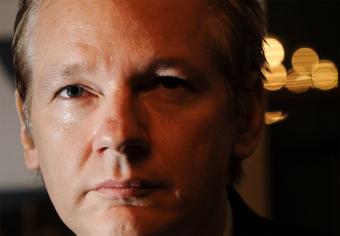
Julian Assange: "Geopolitics will be separated into pre and post 'Cablegate'"
El País features an interview with Julian Assange in the December 5th edition. He talked about the numerous death threats he has been receiving, the attacks against WikiLeaks, the significance of the Cablegate release, and fighting the Swedish case allegations.
On death threats: "We have hundreds of specific death threats from US military militants. That is not unusual, and we have become practiced from past experiences at ignoring such threats from Islamic extremists, African kleptocrats and so on. Recently the situation has changed with these threats now extending out to our lawyers and my children. However it is the specific calls from the elites of US society for our assassination, kidnapping and execution that is more concerning. These range from a US senate bill by John Ensign which seeks to declare us a "transnational threat" to assassination calls from former Bush speechwriters such as Marc Thiessen in The Washington Post and Bill O'Reilly of Fox News."
On the consequences of Cablegate: "It is too early to say yet. The ripples are just starting to flow throughout the world. But I believe geopolitics will be separated into pre and post Cablegate phases."
On the Swedish charges: "We will fight them and expose them, naturally. That there is something "wrong" with this case is now obvious to everyone."
Read the full interview in English or Spanish
Photo credit: AFP
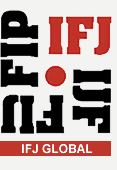
IFJ Condemns United States "Desperate and Dangerous" Backlash over WikiLeaks
The International Federation of Journalists (IFJ) today condemned the political backlash being mounted against the whistle-blowing website WikiLeaks and accused the United States of attacking free speech after it put pressure on the website's host server to shut down the site yesterday.
The website's host Amazon.com blocked access to WikiLeaks after United States officials condemned the torrent of revelations about political, business and diplomatic affairs that has given people around the world unprecedented access to detailed information from United States sources, much of it embarrassing to leading public figures.
"It is unacceptable to try to deny people the right to know," said Aidan White, IFJ General Secretary. "These revelations may be embarrassing in their detail, but they also expose corruption and double-dealing in public life that is worthy of public scrutiny. The response of the United States is desperate and dangerous because it goes against fundamental principles of free speech and democracy."
The IFJ has taken no position on the justification for the release of hundreds of thousands of internal documents which have made headlines around the world in the last few days, but it has welcomed the decision of WikiLeaks to use respected channels of journalism including Der Spiegel, The Guardian, the New York Times, Le Monde and El Pais to filter the information.
By Darren Bailey, Barrister and Solicitor of the Supreme Court of South Australia
Submitted on 04 December 2010
Subject: Julian Assange
Dear Prime Minister,
I wish to strongly associate myself with the letter addressed to you from NSW Supreme Court solicitor Peter Kemp, dated 4 December 2010, concerning the treatment of Mr Julian Assange.
His rights as an Australian citizen are clearly being infringed and should be vigorously protected "though the heavens may fall". As this nation's Prime Minister, and as a lawyer yourself, you ought to know this fact far better than your official statements would indicate.
Please address this issue as a matter of urgency. Demonstrate that to be an Australian citizen actually counts for something.
Sincerely,
Darren Bailey
Solicitor of the Supreme Court of South Australia
The Guardian: WikiLeaks cables blame Chinese government for Google hacking
"The hacking of Google that forced the search engine to withdraw from mainland China was orchestrated by a senior member of the communist politburo, according to classified information sent by US diplomats to Hillary Clinton's state department in Washington.
The leading politician became hostile to Google after he searched his own name and found articles criticising him personally, leaked cables from the US embassy in Beijing say.
That single act prompted a politically inspired assault on Google, forcing it to "walk away from a potential market of 400 million internet users" in January this year, amid a highly publicised row about internet censorship."
Read more
The Guardian: WikiLeaks cables: Spanish PM helped GE beat Rolls-Royce to helicopter deal
"Rolls-Royce lost a lucrative contract to supply helicopter engines to the Spanish military because of a personal intervention by Spain's prime minister, José Luis Zapatero, following vigorous lobbying from US diplomats, according to a secret cable from the US embassy in Madrid.
Eduardo Aguirre, the departing US ambassador to Spain, recounts behind-the-scenes diplomatic machinations that helped General Electric snatch a deal away from Rolls-Royce to provide engines for a state-of-the-art fleet of helicopters bought by the Spanish armed forces, a contract estimated by industry experts to be worth more than £200m.
Details of how Britain's best-known engineering company lost out to the Americans will fuel concerns that the so-called UK-US special relationship does not always deliver results."
Read more
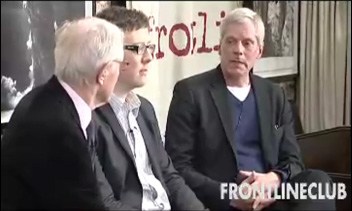
Frontline Club: WikiLeaks - The US embassy cables
This event, held on December 1st, featured WikiLeaks spokesman Kristinn Hrafnsson and data journalist James Ball in a discussion with Colleen Graffy, former deputy assistant secretary of state for public diplomacy (US State Department), and Sir Richard Dalton, associate fellow of the Middle East and North Africa programme at Chatham House. The discussion was moderated by author and broadcaster Tom Fenton.
The video recording of the event is now available on the Frontline website.
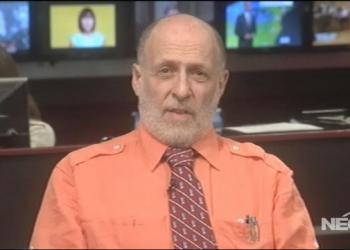
NECN Broadside: WikiLeaks and espionage
Jim Braude interviewed civil rights attorney Harvey A. Silverglate on December 1st about the DoJ statements that they will seek to prosecute Julian Assange and WikiLeaks, potentially under the US Espionage Act. Silverglate, who participated in the Pentagon Papers case and served as the EFF's first litigation counsel, expounded on the difficulties that the US government would face in arguing such a case, and questioned whether it was in the best interests of the government to attempt to bring charges against Julian Assange and WikiLeaks.
He argued that it would be very hard to prove that the United States was harmed by the disclosures, and also that the government could not prosecute charges without having to divulge even more classified information in the process. In Silverglate's opinion, this is a reason why the US government would prefer to see Assange prosecuted in Sweden instead.
The video is available on the NECN website.
BBC HardTalk: WikiLeaks - Open Secrets
In this December 3rd panel show, Host Stephen Sackur speaks with former UK ambassador Carne Ross, former US deputy secretary of state John Negroponte, and WikiLeaks data journalist James Ball about the Cablegate disclosures.
The video is available on the BBC website until December 10th.
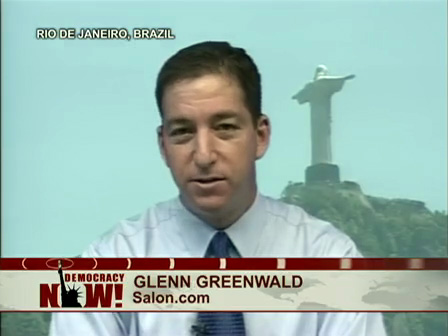
Democracy Now!: Is WikiLeaks’ Julian Assange a Hero?
Amy Goodman and Juan Gonzales hosted a debate between Glenn Greenwald of Salon and Steven Aftergood of Secrecy News on December 3rd.
Glenn Greenwald: "If you look at the overall record of WikiLeaks—and let me just stipulate right upfront that WikiLeaks is a four-year-old organization, four years old. They’re operating completely unchartered territory. Have they made some mistakes and taken some missteps? Absolutely. They’re an imperfect organization. But on the whole, the amount of corruption and injustice in the world that WikiLeaks is exposing, not only in the United States, but around the world, in Peru, in Australia, in Kenya and in West Africa and in Iceland, much—incidents that are not very well known in the United States, but where WikiLeaks single-handedly uncovered very pervasive and systematic improprieties that would not have otherwise been uncovered, on top of all of the grave crimes committed by the United States. There is nobody close to that organization in terms of shining light of what the world’s most powerful factions are doing and in subverting the secrecy regime that is used to spawn all sorts of evils."
The video and full transcript are available on the Democracy Now! website.
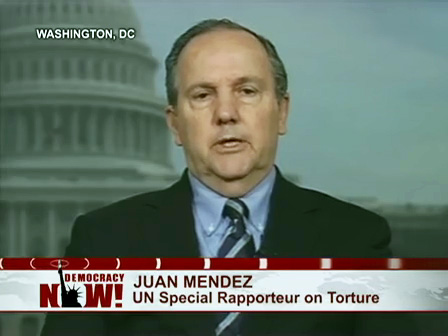
Democracy Now!: U.N. Special Rapporteur Juan Méndez: Instead of Focusing on Assange, U.S. Should Address WikiLeaks’ Disclosures of Torture
Democracy Now! interviewed Juan Méndez, the new U.N. Special Rapporteur on Torture and Other Cruel, Inhuman and Degrading Treatment or Punishment, on December 2nd. The interview focused on Cablegate revelations regarding US spying on UN officials and torture committed under the Bush administration.
Juan Méndez: "What I am really worried about is that we seem to be focusing on whether disclosing these cables is legal or illegal, whether it merits some kinds of action against Mr. Assange. We’re not really discussing the merits, the substance of what some of these things reveal. And in my case, for example, I’m very concerned about the documents that show that literally thousands of people were first imprisoned by American forces and then transferred to the control of forces in Iraq and perhaps even in Afghanistan, where they knew that these people were going to be tortured. That’s a very clear violation of a standard that applies to the United States as a signatory of the Convention Against Torture, and I want to know what’s being done about getting to the bottom of that."
The full video is available on the Democracy Now! website.
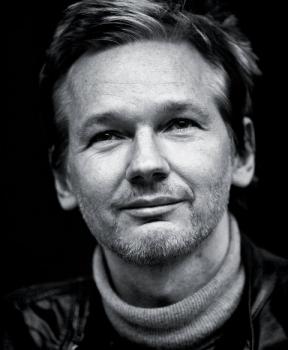
The New York Times' T Magazine features a short profile on Julian Assange and WikiLeaks:
"Julian Assange and WikiLeaks have been jettisoned to fame or notoriety (choose your noun, please) not because of a passing political battle but for reasons much deeper: the desire to possess, distribute and devour information. Ever since the release in July this year of some 92,000 documents relating to America’s involvement in Afghanistan, an old joke from Communist times keeps spinning around my head. ‘‘We cannot predict the future,’’ announces the newsreader of Soviet radio reporting on the Politburo’s deliberations, ‘‘but the past is changing before our very eyes.’’ Now our understanding of the nature of the intervention in Iraq has also changed radically with the publication of a still more astonishing collection of 391,832 secret United States military field reports from the kaleidoscopic theaters of battle.[...]
Assange understands full well the significance of these documents and their surreptitious transmission, and that knowledge translates into power and influence. For most of history, government has enjoyed an easy superiority in adjusting the ebb and flow of information. Now the rules of the contest have changed. In contrast to the petabytes of data flotsam, half-truths and speculation that drift daily around the Internet, WikiLeaks spews forth unvarnished, sensitive truths. Assange’s extraordinary project provides transparency unbridled. Historians, journalists and civic activists will continue to fish in these rich informational waters for some time if the organization does not collapse."
Read more
Photo credit: Max Vadukul, The New York Times
(Please also see parts one, two, three, four, five and six in this series.)
Ryan Gallagher, Open Democracy: Wikileaks: the truth is not treason
"As international reaction testifies, the repercussions of Cablegate are massive. Wikileaks is changing the world without invitation, and the political establishment does not approve.[...]
“You can kill a man but you can't kill an idea,” as the civil rights activist Medgar Evers once said. And an idea is precisely what Wikileaks has become. It is no longer simply a website – it is a pure expression of democratic ideals, a philosophy realised by the force of technology. The powerful may condemn and attempt to repress Wikileaks and all it represents, but the situation has long since spun far from their control. Facilitated by the internet, a new battleground has been established. All traditions now hang in the balance and all bets are off."
Read more
Matthew Down, National Journal: To Tell the Truth
"Everyone in Washington claims to support transparency and government openness during campaign season and when it’s popular to do so. They castigate the other side when it does things in secret and suggest that its intentions must be nefarious if it is unwilling to make its deliberations public. But when an organization discloses how our foreign policy is conducted, some of these same people claim that the release will endanger lives or threaten national security, or that the founder of WikiLeaks is a criminal.
When did we decide that we trust the government more than its citizens? And that revealing the truth about the government is wrong? And why is the media complicit in this? Did we not learn anything from the run-up to the Iraq war when no one asked hard questions about the justifications for the war and when we accepted statements from government officials without proper pushback?[...]
If we want to restore trust in our government, maybe we can start by telling the truth, keeping fewer secrets, and respecting the privacy of average citizens a little more. As Ralph Waldo Emerson once said, “God offers to every mind its choice between truth and repose. Take which you please; you can never have both.”"
Read more
Guy Rundle, Crikey: WikiLeaks -- time for a register
"The first four stories on the UK news tonight were all either created by, or transformed by, the WikiLeaks Cablegate releases.
The governor of the Bank of England has been revealed as no benign public servant, but a player, trying to push the incoming government towards a harsher, more purely Thatcherite economic policy, and worried that they lacked the guts to do it; the Sri Lankan President was greeted with a huge demonstration supercharged with revelations of government involvement in massacres of Tamils; the "special relationship" is being battered by revelations of non-reciprocity on extradition, spy flyovers and the like; and even the separate news of Russia's winning the 2018 World Cup was set in the context of its utter corruption -- something that many people now felt they knew as much about as the elite, dictating the policy we should take towards them.
How long this will go on no-one knows. But while it does, power relations are being subtly transformed in ways that may have effects for some time to come. Once WikiLeaks manage to secure service, and eventually place the Cablegate logs online, there will be three huge volumes -- the Iraq logs, the Afghan logs and Cablegate -- which effectively constitute an alternative history of the present."
Read more
Jim Naureckas, FAIR: WikiLeaks Hasn't 'Leaked' Anything
"Actually, Julian Assange didn't leak anything--he can't, because he didn't have access to classified documents. Someone (or someones) who did have such access leaked those documents to Assange's WikiLeaks, which, as a journalistic organization, made them available to the world, both directly and through other media partners.
This distinction, which is widely ignored in commentary on WikiLeaks, is actually quite important, because the ethical obligations of a government official with a security clearance are quite different from those of a media outlet.[...]
To treat Assange as a leaker when he is, in fact, a journalist is not only morally confusing, it's quite dangerous to journalists in general. If the government can declare Assange to be spy or a terrorist because he's published classified documents he's received, every investigative journalist who does the same thing is in deep trouble."
Read more
John Naughton: What the attacks on WikiLeaks tell us
"Like most people, I’ve only read a fraction of what’s been published by WikiLeaks, but one thing that might explain the official hysteria about the revelations is the way they comprehensively expose the way political elites in Western democracies have been lying to their electorates. The leaks make it abundantly clear not just that the US-Anglo-European adventure in Afghanistan is doomed (because even the dogs in the street know that, as we say in Ireland), but more importantly that the US and UK governments privately admit that too.
The problem is that they cannot face their electorates — who also happen to be the taxpayers who are funding this folly — and tell them this.[...]
What WikiLeaks is exposing is the way our democratic system has been hollowed out. Governments and Western political elites have been shown to be incompetent (New Labour and Bush Jnr in not regulating the financial sector; all governments in the area of climate change), corrupt (Fianna Fail in Ireland, Berlusconi in Italy; all governments in relation to the arms trade) or recklessly militaristic (Bush Jnr and Tony Blair in Iraq) and yet nowhere have they been called to account in any effective way. Instead they have obfuscated, lied or blustered their way through. And when, finally, the veil of secrecy is lifted in a really effective way, their reaction is to try to silence the messenger — as Noam Chomsky pointed out."
Read more
Bernard Keane, Crikey: Missing the point on WikiLeaks
"This rolling series of releases — and WikiLeaks has barely begun to release the amount of material it has — is raising fundamental issues not merely about statecraft and diplomacy but information, power and the role of the media. Guy Rundle spotted this immediately, and while I would say that, wouldn’t I, his analysis has been the best you’ll see in an Australian publication. This is about far more than a simple matter of leaking sensitive cables, or newspaper coverage of those leaks.
Instead we’re given an uncomprehending coverage by the Australian media, as if it simply can’t process what’s happening, and needs to keep trying different narratives to see if they fit what’s being observed, sticking with whatever seems to temporarily do the trick.[...]
It’s not entirely fair to blame the media, though, because the Australian government is doing exactly the same thing. The response of the federal government has been… I was going to say “instructive”, but it’s more accurately, and sadly, affirmative of what you suspected, that politicians and bureaucrats can’t see this through any other than a rather 20th century, Cold War-style lens."
Read more
James Moore, The Huffington Post: WikiLeaks and the Myth of Journalistic Objectivity
"There is a very simple reason WikiLeaks has sent a furious storm of outrage across the globe and it has very little to do with diplomatic impropriety. It is this: The public is uninformed because of inadequate journalism. Consumers of information have little more to digest than Kim Kardashian's latest paramour or the size of Mark Zuckerberg's jet. Very few publishers or broadcasters post reporters to foreign datelines and give them time to develop relationships that lead to information. Consequently, journalism is atrophying from the extremities inward and the small heart it has will soon become even more endangered.
So, long live WikiLeaks and Julian Assange. And if Pfc. Bradley Manning is the leaker, he deserves the Presidential Medal of Freedom.
Good government, if such a thing exists, is the product of transparency. Americans have very little idea of the back-stories that lead to the events they see on the nightly news or read about on the net. How did such messes end up being such messes? If journalism were functioning at appropriate levels, there would have been stories that reported some of the information contained in the cables now published around the globe."
Read more
Nils Molina, The Tech: WikiLeaks serves the global community by keeping governments in check
"WikiLeaks helped expose the looting of Kenya, the corruption of a banking system and sloppy killings committed by the U.S. military. WikiLeaks should be lauded for using truth to pressure these institutions to re-evaluate themselves. Thinking that the U.S. military does not need outside scrutiny to effectively serve the public is as foolish as thinking that the MIT administration can by itself design a good undergraduate dining plan. The entrenched bureaucracy that generates military decisions can fail spectacularly, with history providing examples ranging from the Vietnam War to the often irrational Soviet military build-up. Leaking information that changes how one evaluates a war is free press doing its job. Transparency matters.[...]
Just like a business, the government should respond to the leaks by becoming more open and honest, better hiding the little information that must remain secret and re-evaluating its bureaucratic activities. WikiLeaks is a resilient and powerful organization of journalists. Designating it as a terrorist group, as the incoming chairman of the House Homeland Security Committee has suggested, or engaging in an expensive international chase, as Keith Yost recommends, would be a public relations nightmare."
Read more

RSF: WikiLeaks hounded?
Reporters Sans Frontières (Reporters Without Borders) issued an official statement on WikiLeaks and Cablegate. The French version is available here.
"Reporters Without Borders condemns the blocking, cyber-attacks and political pressure being directed at cablegate.wikileaks.org, the website dedicated to the US diplomatic cables. The organization is also concerned by some of the extreme comments made by American authorities concerning WikiLeaks and its founder Julian Assange.
Earlier this week, after the publishing several hundred of the 250.000 cables it says it has in its possession, WikiLeaks had to move its site from its servers in Sweden to servers in the United States controlled by online retailer Amazon. Amazon quickly came under pressure to stop hosting WikiLeaks from the Senate Committee on Homeland Security and its chairman, Sen. Joe Lieberman, in particular.
After being ousted from Amazon, WikiLeaks found a refuge for part of its content with the French Internet company OVH. But French digital economy minister Eric Besson today said the French government was looking at ways to ban hosting of the site. WikiLeaks was also recently dropped by its domain name provider EveryDNS. Meanwhile, several countries well known for for their disregard of freedom of expression and information, including Thailand and China, have blocked access to cablegate.wikileaks.org.
PayPal joined Moneybookers, Amazon, Tableau and EveryDNS in cancelling services for WikiLeaks.
In a statement posted on its website, the company wrote: "PayPal has permanently restricted the account used by WikiLeaks due to a violation of the PayPal Acceptable Use Policy, which states that our payment service cannot be used for any activities that encourage, promote, facilitate or instruct others to engage in illegal activity. We’ve notified the account holder of this action."
Daniel Ellsberg and many WikiLeaks supporters have called for a boycott of Amazon. PayPal may be next.
There are many other ways for supporters of truth and free speech to contribute to WikiLeaks, and we would like to encourage you to do so: http://213.251.145.96/support.html
By Peter Kemp, Solicitor of the Supreme Court of New South Wales, on 2010-12-04
Dear Prime Minister
From the Sydney Morning Herald I note you made a comment of "illegal" on the matter of Mr Assange in relation to the ongoing leaks of US diplomatic cables.
Previously your colleague and Attorney General the Honourable McClelland announced an investigation of possible criminality by Mr Assange.
As a lawyer and citizen I find this most disturbing, particularly so when a brief perusal of the Commonwealth Criminal Code shows that liability arises under the Espionage provisions, for example, only when it is the Commonwealth's "secrets" that are disclosed and that there must be intent to damage the Commonwealth.
Likewise under Treason law, there must be an intent to assist an enemy. Clearly, and reinforced by publicly available material such as Professor Saul's excellent article:
http://www.theage.com.au/opinion/society-and-culture/dont-cry-over-wikil...
...Julian Assange has almost certainly committed no crime under Australian law in relation to his involvement in Wikileaks.
I join with Professor Saul also in asking you Prime Minister why has there been no public complaint to the US about both Secretaries of State Condaleeza Rice and Hillary Clinton being in major breach of International law ie UN Covenants, by making orders to spy on UN personnel, including the Secretary General, to include theft of their credit card details and communication passwords. Perhaps the Attorney General should investigate this clear prima facie evidence of crime (likely against Australian diplomats as well), rather than he attempts to prosecute the messenger of those crimes.
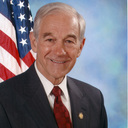
While some of his colleagues are calling for Julian Assange to be prosecuted as a terrorist or assassinated, in an interview on Fox News' Freedom Watch on Thursday, Republican Rep. Ron Paul said that Julian Assange and WikiLeaks should get the same kind of protections as the mainstream media when it comes to releasing information.
"In a free society we're supposed to know the truth," Paul said, quoted by Politico. "In a society where truth becomes treason, then we're in big trouble. And now, people who are revealing the truth are getting into trouble for it."
"This whole notion that Assange, who's an Australian, that we want to prosecute him for treason. I mean, aren't they jumping to a wild conclusion?” he added. “This is media, isn't it? I mean, why don't we prosecute The New York Times or anybody that releases this?"
"What we need is more WikiLeaks about the Federal Reserve," he added. "Can you imagine what it'd be like if we had every conversation in the last 10 years with our Federal Reserve people, the Federal Reserve chairman, with all the central bankers of the world and every agreement or quid-pro-quo they have? It would be massive. People would be so outraged."
In a Twitter post on Friday, Ron Paul wrote: "Re: WikiLeaks — In a free society, we are supposed to know the truth. In a society where truth becomes treason, we are in big trouble."
(Parts 1-4 of this coverage series can be found here, here, here, and here.)
United States: The Office of Management and Budget today directed all federal agencies to bar employees from accessing the Wikileaks web site. Talking Points Memo obtained a copy of letter sent out by OMB, which "directed the agencies to immediately tell their employees to 'safeguard classified information' by not accessing Wikileaks over the Internet.
Classified information, the OMB notes, 'remains classified ... until it is declassified by an appropriate U.S. Government authority.' Employees may not view classified info over a non-classified system (i.e., the Internet), the OMB says, 'as doing so risks that material still classified will be placed onto non-classified systems.'"
Read more
AFP, The Guardian and CNN have more on the story.
Update 1: Gawker reports that "U.S. soldiers in Iraq who try to read about the Wikileaks disclosures—or read coverage of them in mainstream news sites—on unclassified networks get a page warning them that they're about to break the law.[...]
A tipster wrote to tell us that 'the Army's unclassified, NIPRNET network in Iraq has blocked every major news website because of the Wikileaks issue,' going on to say that Foxnews.com, CNN.com, MSNBC.com, the Huffington Post, and a variety of other sites are blocked on the Army's unclassified network."
Update 2: US corporations are getting in on the censorship game too. We are informed that HP sent out a letter to all employees warning them not to visit the WikiLeaks website. Will HP censor The New York Times as well?
Canada: The Montreal Gazette reports that "Defence Department staff have been warned against using government computers to sift through secret documents released by WikiLeaks. An email dubbed 'Wikileaks Notice' in the subject line says military computers are 'not to be used to visit the Wikileaks site or any other websites containing such information.'"
Update 3: Australia: We were also informed that a letter was sent out on the Australian defence network yesterday, warning employees not to access WikiLeaks, which would be considered a security breach.
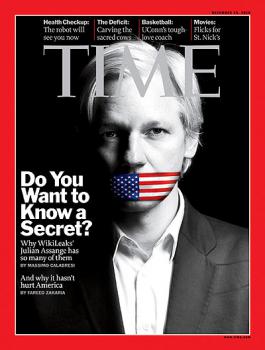
TIME magazine's December 13 edition features Julian Assange on the cover and a number of WikiLeaks-related articles, including Massimo Calabresi's cover story, WikiLeaks' War on Secrecy: Truth's Consequences, and an additional feature by Fareed Zakaria: WikiLeaks Shows the Skills of U.S. Diplomats.
Further TIME WikiLeaks coverage includes an interview with Julian Assange, features on the US relationship with Germany and Pakistan, and deception in Mideast diplomacy. TIME also spoke with Julian Assange's lawyer Björn Hurtig about the Sweden case.
We would like to remind you that you can still vote for Julian Assange in TIME's Person of the Year reader poll.

The Australian Media, Entertainment and Arts Alliance issued an official statement on WikiLeaks:
Alliance condemns WikiLeaks backlash
The Alliance condemns the political attacks being made against whistleblowing website WikiLeaks, and says the vital role of the press in reporting matters in the public interest and holding the powerful to account must be respected.
Amazon.com ceased to host WikiLeaks after United States officials condemned the torrent of revelations about political, business and diplomatic affairs that has given the public unprecedented access to detailed information from United States sources, much of it embarrassing to leading public figures.
“Amazon’s decision is extremely disappointing,” said Alliance federal secretary, Christopher Warren. “We need to take a step back from the hysteria. It is not known whether WikiLeaks has broken any law. It has – via a free media – upheld the public’s right to know. ”
The Alliance welcomes the decision of WikiLeaks to collaborate with respected publications, including Der Spiegel, The Guardian, the New York Times, Le Monde and El Pais.
“These publications have given assurances that the material published does not put the lives of individuals or sources at risk or reveal material that compromises ongoing military operations or the location of special forces.” said Warren
The Alliance is concerned that the Australian Government has signalled that it may attempt to pressure Australian media outlets not to report some of the WikiLeaks information. “Given that WikiLeaks is working with five leading media organisations around the world to publicise the Cablegate material, any attempt to muzzle the Australian media in this instance would ultimately prove pointless,” Warren said.
The Alliance is concerned about the welfare and well-being of WikiLeaks founder Julian Assange, and Bradley Manning, the United States soldier who is under arrest and suspected of leaking the information.
“This is a time for calm. The leaks are astonishing in their volume, and what they reveal. But this is not the first time that government or diplomatic material has been leaked.” said Warren.
The Alliance says attacks on Assange and Manning point to a dangerous atmosphere of intolerance and persecution not just for the two men, but for all journalists investigating public affairs.
Martin Kettle, The Guardian: WikiLeaks: Openness against secrecy has a rich history of struggle
"Why WikiLeaks? Or, why these leaked documents and not other ones, and why these documents now? The answers may seem obvious. Because we can. Because they're there. Because we want to. Because it is in the public interest, or at least of interest to the public, even though that's not the same thing. All these are parts of the larger answer. But they aren't the full explanation.[...]
The broad parallels with today are very strong. A war that was widely opposed; a traumatic generational experience; a collective belief that the people were deceived; a conviction that public inquiries and the opening up of documents would reveal the incriminating evidence, and a desire to change the rules, above all by making them more democratically accountable, to avoid the same thing happening again. All these were present in the generation that lived through the first world war. All are present today in the generation that has lived through the Iraq and Afghan conflicts.[...]
Why WikiLeaks? Partly because we can. But, now as in the past, it is about a needless war and the governments that chose to fight it."
Read more
David Samuels, The Atlantic: The Shameful Attacks on Julian Assange
"It is dispiriting and upsetting for anyone who cares about the American tradition of a free press to see Eric Holder, Hillary Clinton and Robert Gibbs turn into H.R. Haldeman, John Erlichman and John Dean. We can only pray that we won't soon be hit with secret White House tapes of Obama drinking scotch and slurring his words while calling Assange bad names.[...]
But the truly scandalous and shocking response to the Wikileaks documents has been that of other journalists, who make the Obama Administration sound like the ACLU.[...] It is a fact of the current media landscape that the chilling effect of threatened legal action routinely stops reporters and editors from pursuing stories that might serve the public interest - and anyone who says otherwise is either ignorant or lying. Every honest reporter and editor in America knows that the fact that most news organizations are broke, combined with the increasing threat of aggressive legal action by deep-pocketed entities, private and public, has made it much harder for good reporters to do their jobs, and ripped a hole in the delicate fabric that holds our democracy together.
In a memorandum entitled "Transparency and Open Government" addressed to the heads of Federal departments and agencies and posted on WhiteHouse.gov, President Obama instructed that "Transparency promotes accountability and provides information for citizens about what their Government is doing." The Administration would be wise to heed his words -- and to remember how badly the vindictive prosecution of Daniel Ellsberg ended for the Nixon Administration. And American reporters, Pulitzer Prizes and all, should be ashamed for joining in the outraged chorus that defends a burgeoning secret world whose existence is a threat to democracy."
Read more
Editorial, The Guardian: US embassy cables: Wiki witch-hunt
"There have been various suggestions as to what to do to Julian Assange, the founder of WikiLeaks, after a week in which his revelations have severely embarrassed US diplomacy. Tom Flanagan, a former aide to the Canadian prime minister, called for his assassination, and then regretted his glib remark. Mike Huckabee said that those found guilty of leaking the cables should be executed for putting national security at risk. You would expect a future Republican presidential candidate to say that. But a Democrat administration is close behind. A team from the justice department and the Pentagon are exploring whether to charge Mr Assange under the Espionage Act. The US attorney general, Eric Holder, has said this is not sabre-rattling. Are they all about to turn into minions of which Richard Nixon would have been proud?
More insidious than that was the complacent yawn emanating from from sections of the liberal commentariat for which freedom of information is a given. So what's new about the Gulf Arab Sunnis wanting America or Israel to bomb Iran, or Colonel Gaddafi's taste for blonde Ukrainian nurses, or Nicolas Sarkozy being described as mercurial and authoritarian, they sneer. Maybe for them, nothing is new. Would that we all could be so wise. But for large areas of the world which do not have the luxury of being able to criticise their governments, the revelations about the private thoughts of their own leaders are important."
Read more
Jay Rosen on Pressthink (video)
"While we have what purports to be a "watchdog press" we also have, laid out in front of us, the clear record of the watchdog press's failure to do what is says it can do, which is to provide a check on power when it tries to conceal its deeds and its purpose. So I think it is a mistake to reckon with Wikileaks without including in the frame the spectacular failures of the watchdog press over the last 10, 20, 40 years, but especially recently. And so, without this legitimacy crisis in mainstream American journalism, the leakers might not be so inclined to trust Julian Assange and a shadowy organization like Wikileaks. When the United States is able to go to war behind a phony case, when something like that happens and the Congress is fooled and a fake case is presented to the United Nations and war follows and 100,000s of people die and the stated rationale turns out to be false, the legitimacy crisis extends from the Bush government itself to the American state as a whole and the American press and the international system because all of them failed at one of the most important things that government by consent can do: which is reason giving. I think these kind of huge cataclysmic events within the legitimacy regime lie in the background of the Wikileaks case, because if wasn't for those things Wikileaks wouldn't have the supporters it has, the leakers wouldn't collaborate the way that they do and the moral force behind exposing what this government is doing just wouldn't be there."
Watch the video
Simon Jenkins, The Guardian: In this World Cup sewer, we reptiles of British journalism hold our heads high
"Yet journalism's stock-in-trade is disclosure. As we have seen this week with WikiLeaks, power loathes truth revealed. Disclosure is messy and tests moral and legal boundaries. It is often irresponsible and usually embarrassing. But it is all that is left when regulation does nothing, politicians are cowed, lawyers fall silent and audit is polluted. Accountability can only default to disclosure. As Jefferson remarked, the press is the last best hope when democratic oversight fails, as it does in the case of most international bodies.
I found myself chastised this week for my defence of WikiLeaks, on the ground that thieves should not revel in their crime by demanding that victims be more careful with their property. But in matters of public policy who is thieving what from whom? The WikiLeaks material was left by a public body, the US state department, like a wallet open on a park bench, except that in this case the wallet was full of home truths about the mendacity of public policy.[...]
What is intriguing is the hysteria of power at seeing its inner beliefs and processes revealed. The denunciation of WikiLeaks as an "attack on America" from the political right is similar to the attitude of Britain's football authorities towards the Sunday Times and the BBC. Someone had broken wind in church. Truth briefly swept aside the deceptions of public form and left reality exposed. The players in a once subtle game that had fallen to lying and cat-calling were suddenly told to stop, pull themselves together and look each other in the eye. As the great Donald Rumsfeld said, stuff happens. The air is cleared.[...]
So thank goodness for disclosure. Thank goodness for journalism."
Read more
World Socialist Web Site: The persecution of WikiLeaks’ Julian Assange
Joseph Kishore writes on behalf of WSWS: "The American state, its spokesmen in the mass media, and its allies around the world are engaged in an international campaign of vilification and persecution against WikiLeaks’ founder Julian Assange.
This campaign has nothing to do with any supposed crime he has committed, since he has committed none. He is the target of an international manhunt for his role in lifting the lid on the lies and criminal operations of imperialist powers the world over—above all, in the United States.[...]
The persecution of Assange in an effort to silence this exposure is not simply a threat to one individual. The methods employed against WikiLeaks will be used against all opposition to the policies of the corporate and financial aristocracy.[...]
In the final analysis, the hysterical witch-hunt against Assange and WikiLeaks is not any sign of strength on the part of the American ruling elite and its state, but rather of fear and weakness. Intensely conscious of the crisis and instability of the political and economic system, they fear that revelations of state crimes will only fuel the inevitable eruption of mass working class opposition to their reactionary policies in the US and around the world. It is this emerging movement of social struggles on a global scale that must undertake an implacable defense of Assange, WikiLeaks and all those who seek to drag the crimes and conspiracies of imperialism into the light of day."
Read more
Robert Niles, Online Journalism Review: Wikileaks challenges journalists: Whose side are you on?
"I hope that Wikileaks, at the very least, encourages reporters to be more aggressive in challenging authority and working with sources to get information that officials, in government or industry, would prefer to keep from the public's eyes.
Sources with government and industry want the truth to get to the public. If journalists do not provide the means to make that happen, alternate media such as Wikileaks will do it instead. Personally, as a citizen, I'm thankful for that.[...]
Reporters' reaction to Wikileaks divides us into two camps: Those who want to see information get to the public, by whatever means, and those who want to control the means by which information flows. While it's fine to want to be the reporter who always gets the scoop, I can't support journalists who imply that the public's better served by having stories go unreported than going through "Journalism-approved" channels.
If you're upset with the way that Wikileaks is getting information to the public, then you'd better try harder to gather and publish that information yourself. (As Rosen suggested yesterday, we wouldn't have Wikileaks if we had a functioning watchdog press.) And if you think that the public shouldn't have information that the government wishes to withhold, might I suggest that you are in the wrong line of work?"
Read more
Nikki Usher, Nieman Journalism Lab: Why WikiLeaks’ latest document dump makes everyone in journalism — and the public — a winner
"Imagine this: Look at what happens when mainstream news and whatever we want to call WikiLeaks work together. The forces are not in opposition but are united with a common goal — again, informing the public — and the result is that mainstream news can do what it does best thanks to the help of the information WikiLeaks provides. (But, of course, it couldn’t do it without WikiLeaks.) This is a moment of glory for all those who talk about crowdsourcing, user-generated content, and the like. Perhaps this is the ultimate form of users helping to create and shape the news. And the result is a better-informed public.
The takeaway here: Everyone in journalism — from its practitioners to its recipients — emerges from this data drop as a winner."
Read more
Dominique Cardon, Le Monde: En finir avec le culte du secret et de la raison d'Etat (End the cult of secrecy and reasons of state)
"Under the pretext of a tyranny of transparency, the affair WikiLeaks has reanimated in some the cult of secrecy and of reasons of state. One more revelation, and it will be the virtues of Machiavellian politics that will be rehabilitated, and, with them, this habit of protecting any and all acts on behalf of the discretionary "secret defence" power.[...]
It is however less the risk of transparency than that of opacity that threatens the communication of the economic and political powers today. The demand for inside information appears thus as a countereffect to the hypertrophy of communication strategies that clothe the discourse of power in a language increasingly artificial.
Whatever its origin, the abundance of data does not constitute a "conter-democracy" without the mobilization of communities of interpreters who can give it context, sense, narrative and visibility. Societal conversation demands greater and easier access to data, but it demands above all that the politics create a desire for conversation."
Read more
Rebecca MacKinnon, CNN: WikiLeaks, Amazon and the new threat to internet speech
"While Amazon was within its legal rights, the company has nonetheless sent a clear signal to its users: If you engage in controversial speech that some individual members of the U.S. government don't like -- even if there is a strong case to be made that your speech is constitutionally protected -- Amazon is going to dump you at the first sign of trouble.
Let's hope that there will always be other companies willing to stand up for our rights as enshrined both in the U.S. Constitution and in the Universal Declaration of Human Rights -- and by extension their right to do business with us.
The future of freedom in the internet age may well depend on whether we the people can succeed in holding companies that now act as arbiters of the public discourse accountable to the public interest."
Read more
Sofia Mirjamsdotter, Metro: Bara en diktatur kan förbjuda Wikileaks (Only a dictatorship would ban WikiLeaks)
"Either you believe in democracy and freedom of speech, or you do not. There is no middle position.
The internet allows for the collection and dissemination not only of innocent status updates from private individuals, but also, as in the case of WikiLeaks, of document addressing issues directly linked to world peace and war.
Every friend of democracy must appreciate this. Any person who believes in and advocates freedom of speech should encourage and cheer for this kind of use of the internet.
Democracy is back. And one of its tenets is that we must abide by the majority, even when the majority are wrong. Another is that we must allow all kinds of opinions, even those we disagree with. The alternative is that a few should be placed above all others, and that they should decide what is acceptable to say. Another word for that is dictatorship."
Read more
The Guardian: WikiLeaks cables: Conservatives promised to run 'pro-American regime'
"Conservative party politicians lined up before the general election to promise that they would run a "pro-American regime" and buy more arms from the US if they came to power this year, the leaked American embassy cables show.[...]
The incoming Conservatives appear to have made some wide-ranging offers of political co-operation with the US. The cables detail a series of private meetings with Tory frontbenchers, many of whom are now in the cabinet.
Liam Fox, now the defence secretary, promised to buy American military equipment, while the current foreign secretary, William Hague, offered the ambassador a "pro-American" government. Hague also said the entire Conservative leadership were, like him, "staunchly Atlanticist" and "children of Thatcher"."
Read more
The Guardian: WikiLeaks cables reveal how US manipulated climate accord
"Hidden behind the save-the-world rhetoric of the global climate change negotiations lies the mucky realpolitik: money and threats buy political support; spying and cyberwarfare are used to seek out leverage.
The US diplomatic cables reveal how the US seeks dirt on nations opposed to its approach to tackling global warming; how financial and other aid is used by countries to gain political backing; how distrust, broken promises and creative accounting dog negotiations; and how the US mounted a secret global diplomatic offensive to overwhelm opposition to the controversial "Copenhagen accord", the unofficial document that emerged from the ruins of the Copenhagen climate change summit in 2009."
Read more
Der Spiegel: "'Operation Scorched Earth': A US Hand in Yemen's Civil War"
Theme by Danetsoft and Danang Probo Sayekti inspired by Maksimer